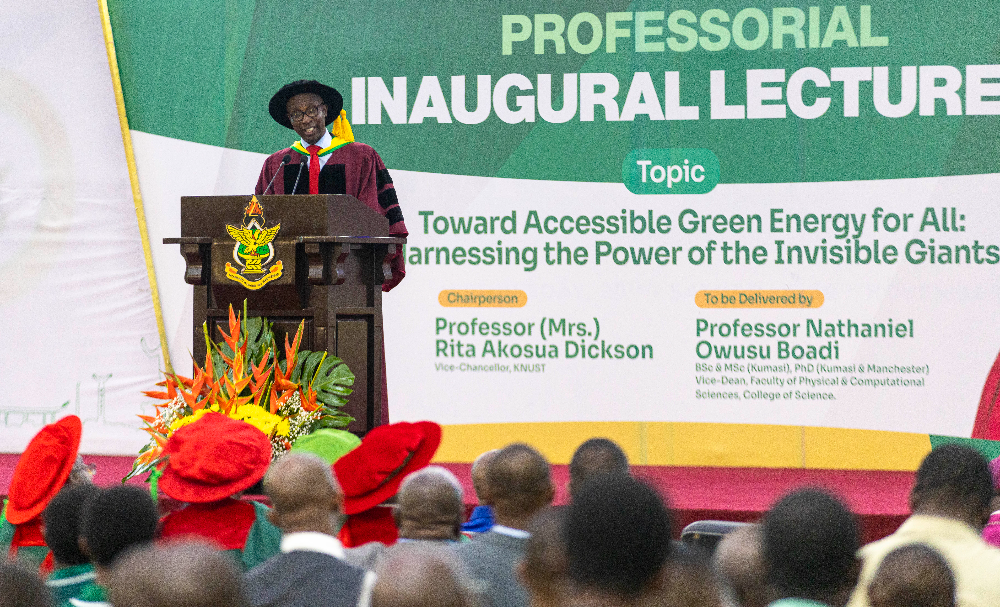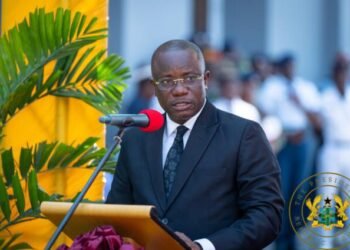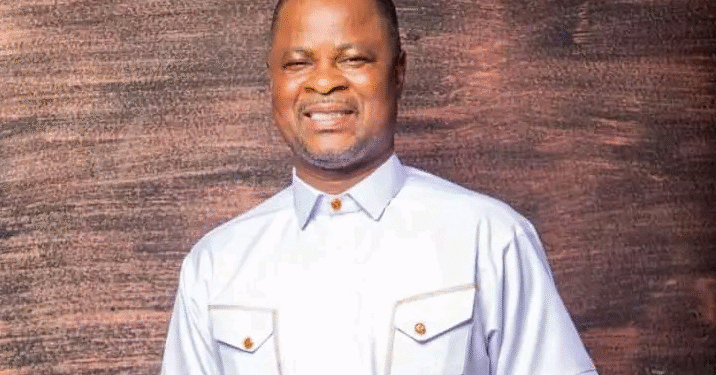Prof. Nathaniel Owusu Boadi, a renowned scientist from the Kwame Nkrumah University of Science and Technology (KNUST), has called on the Government of Ghana to take bold steps toward adopting nanotechnology as a solution to the country’s energy challenges.
He stressed that advanced nanomaterials present an affordable and efficient alternative to traditional silicon-based solar cells, which could significantly reduce the cost of solar energy, making it accessible to underserved communities and off-grid areas.
“Affordable and clean energy is not a distant dream. Thanks to nanotechnology, it is within our grasp.
“We now have the knowledge and capacity to create solar solutions that are not only cheaper but tailored to our local environment and needs.”
Prof. Nathaniel Owusu Boadi, Scientist from KNUST
Delivering his inaugural professorial lecture titled “Toward Accessible Green Energy for All: Harnessing the Power of the Invisible Giants,” Prof. Owusu Boadi presented a compelling vision for Ghana’s energy future powered by homegrown nanotechnology innovations.
He emphasized that recent advancements in nanomaterials offer a cost-effective, sustainable, and locally viable alternative to conventional energy technologies such as silicon-based solar cells.

In his lecture, Prof. Boadi highlighted how these “invisible giants” could revolutionize energy production, storage, and consumption in Ghana and across Africa.
He noted that the high cost of traditional solar panels remains a significant barrier to widespread adoption in rural and off-grid communities.
However, with innovations in nanomaterials, particularly in perovskite and quantum dot solar cells, the cost of manufacturing solar panels could drop significantly, enabling broader access to clean power.
Beyond generation, he also underscored the potential of nanomaterials to improve energy storage systems such as batteries, making them more efficient, durable, and environmentally friendly.
“Our work has already led to the development of four lead-based crystal structures, accepted by the Cambridge Crystallographic Data Centre.
“This is not just academic recognition—it’s a testament that Ghanaian research is contributing to the global body of knowledge in material science.”
Prof. Nathaniel Owusu Boadi, Scientist from KNUST
Call for Strategic Energy Investment

While the scientific groundwork is being laid, Prof. Boadi called on policymakers to match this progress with bold investments and policy reforms.
He urged the Ministries of Finance and Energy to increase funding for nanotechnology research and development, warning that without such support, Ghana risks falling behind in the global green energy transition.
“We cannot afford to remain mere consumers of foreign technology.
“Ghana must take its place as an innovator in green energy—starting with support for local research and production of nanomaterials.”
Prof. Nathaniel Owusu Boadi, Scientist from KNUST
He also advocated for the creation of a National Nanotechnology Research Centre. The proposed facility would serve as a hub for collaboration between academia, government, and industry, driving the commercialization of new technologies and fast-tracking innovation in energy and materials science.

“With such a centre, we can incubate startups, attract international collaboration, and empower young scientists to develop real-world solutions.”
Prof. Nathaniel Owusu Boadi, Scientist from KNUST
While making the case for nanotech’s benefits, the professor was equally cautious about the risks.
He stressed the need for regulatory frameworks to ensure the safe production and use of nanomaterials.
He called on agencies such as the Food and Drugs Authority (FDA), the Environmental Protection Agency (EPA), and the Ghana Standards Authority to develop science-based standards that both safeguard public health and foster innovation.
“This is not just about research—it’s about impact. Imagine a rural health clinic powered entirely by low-cost solar panels developed in Ghana. This is the kind of future nanotech can deliver.”
Prof. Nathaniel Owusu Boadi, Scientist from KNUST
Prof. Nathaniel Owusu Boadi’s push for nanotechnology-driven energy solutions marks a pivotal moment in Ghana’s scientific and industrial evolution.
With government support, strategic investments, and strong regulatory oversight, Ghana can harness the potential of nanotechnology to ensure affordable, sustainable, and accessible green energy for all.
READ ALSO: OmniBSIC Bank Sets the Pace with Record-Breaking Health Walk and Digital Banking Innovation























